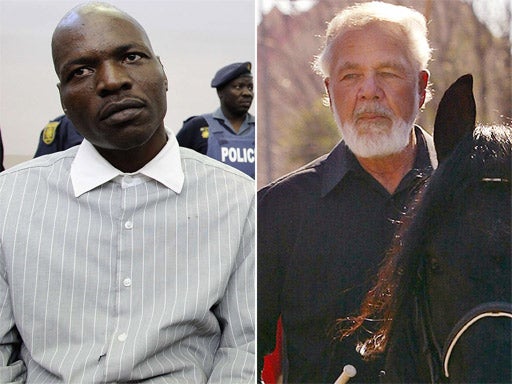Farmworker found guilty of killing Eugene Terre'blanche
Tensions high as second man cleared of murder of white supremacist leader at farm in 2010

Your support helps us to tell the story
From reproductive rights to climate change to Big Tech, The Independent is on the ground when the story is developing. Whether it's investigating the financials of Elon Musk's pro-Trump PAC or producing our latest documentary, 'The A Word', which shines a light on the American women fighting for reproductive rights, we know how important it is to parse out the facts from the messaging.
At such a critical moment in US history, we need reporters on the ground. Your donation allows us to keep sending journalists to speak to both sides of the story.
The Independent is trusted by Americans across the entire political spectrum. And unlike many other quality news outlets, we choose not to lock Americans out of our reporting and analysis with paywalls. We believe quality journalism should be available to everyone, paid for by those who can afford it.
Your support makes all the difference.A 29-year-old black farmworker has been found guilty of murdering the white supremacist Eugene Terre'blanche in 2010 – a killing which had sparked fears of a return to early post-apartheid racial tensions in South Africa.
Outside the high court in the north-west farming town of Ventersdorp, police had set up cordons to separate supporters of the farmworker and his accomplice, and about 60 members of Terre'blanche's Afrikaner Weerstandsbeweging (Afrikaner Resistance Movement – AWB), who were dressed in military fatigues and holding their red, white and black, swastika-style flag.
Judge John Horn, who said a wage dispute had been at the centre of the murder, found the farmworker, Chris Mahlangu, guilty of murder. He acquitted the second man, Patrick Ndlovu, 18, of murder and of attempted robbery. Ndlovu, who was a minor at the time of the murder, was instead found guilty of housebreaking. Both men will be sentenced next month.
Outside South Africa, the April 2010 killing was seen as evidence that the country's race relations remained as fraught as they had been in 1994 when apartheid ended. But in South Africa, the case drew little attention from the media or the public, and mainly showed how irrelevant the AWB had become in the absence of its white-bearded leader.
Prosecutors said Mahlangu and Ndlovu broke into Terre'blanche's home in Ventersdorp where they found the 69-year-old asleep. They allegedly bludgeoned him to death with an iron bar.
Judge Horn dismissed Mahlangu's claim that he had acted in self-defence. The judge said Ndlovu was a passive bystander and that there was no evidence Terre'blanche was killed due to his political views, but that the dispute was purely over wages. While Terre'blanche was portrayed as arrogant and violent, neither of the two accused testified about these alleged character traits, or any claims of abuse.
Judge Horn also rejected claims – made by the defence during the trial – that Terre'blanche had sodomised Mahlangu. "Sodomy is such a personal intrusion, I can't believe [Mahlangu] would not have raised it immediately [in his police statement]," Judge Horn said. The judge said Mahlangu had seen the semen-like fluid on Terre'blanche's genitals as an opportunity to use sodomy as a defence. But police never proved that the fluid had been semen.
Terre'blanche helped found the AWB in 1973 to protect the rights of Afrikaners in the face of reforms by the minority white government. In the 1990s, the group waged a violent campaign to resist the end of apartheid. Its members planted bombs, adopted military uniforms and called for an all-white homeland in post-apartheid South Africa. Terre'blanche spent three years in jail after the attempted murder of a farmworker in 2001.
Join our commenting forum
Join thought-provoking conversations, follow other Independent readers and see their replies
Comments